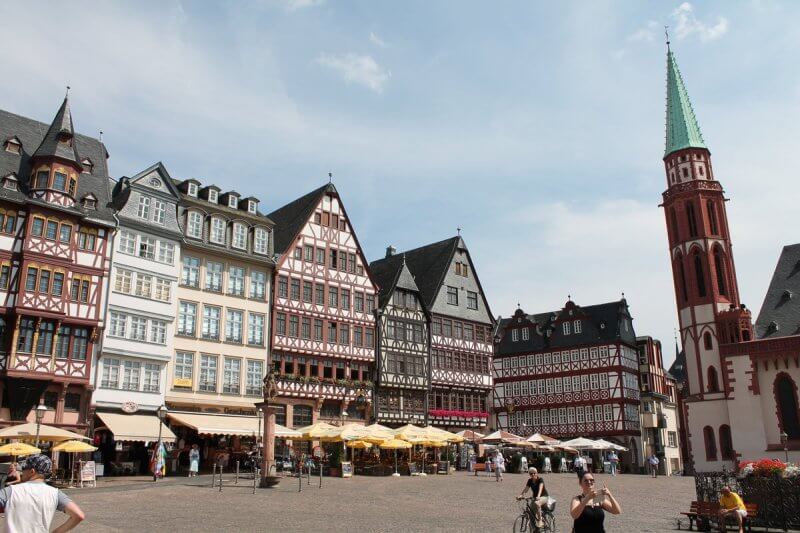Duisburg, Germany is a city with a rich history and a developed industry. Unlike other German cities, here they did not demolish dozens of old factories and plants, but made them the main attractions of the region.
General information
Duisburg is a city in the western part of Germany, near Düsseldorf. It covers an area of 232.8 km². The population is 494,000 (constantly decreasing).
The city is located at the confluence of the Rhine and the Ruhr, and it is home to one of Germany’s largest river ports.
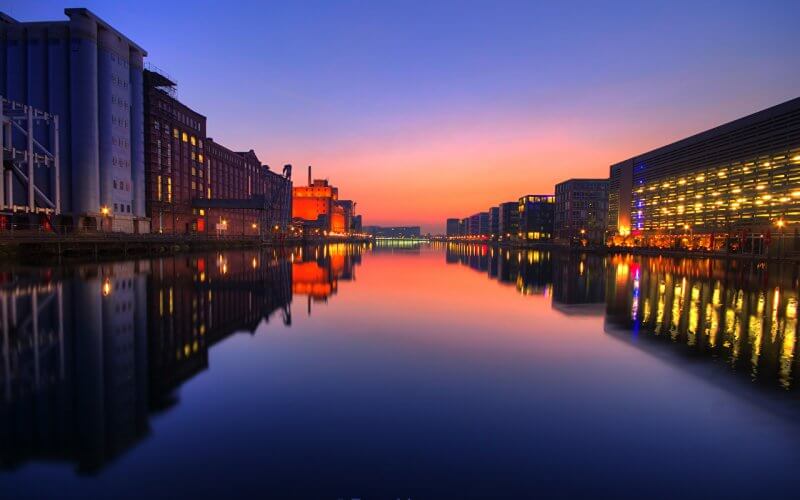
The first records of the city date back to the 5th century, when Duisburg became the capital of the Franks. In the 10th century, an imperial residence was built in the city, and around 1000, the city faced a severe economic crisis due to the shift of the Rhine River to the west. The city later became part of the Hanseatic League (the first economic alliance in Europe), and in 1655, a university was established in the city.
Attractions
Duisburg is a rather industrial city, and despite the fact that it was founded in the 5th century, there are not many attractions here.
Landschaftspark
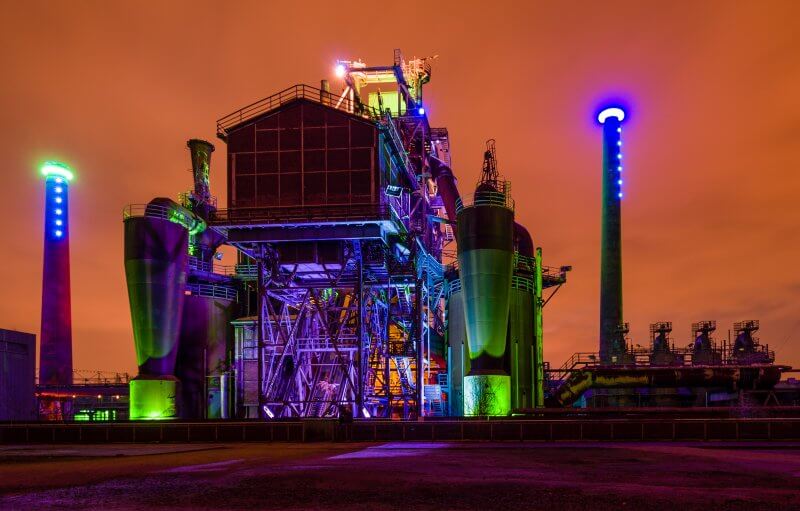
Landschaftspark is a city park located in Germany. The authorities have been thinking for a long time about how to attract tourists to the city, and in 1991 it was decided to create a park on the site of a former industrial zone. Old factory chimneys, factory premises and warehouses have not disappeared – they still stand here, but on the territory of the park many trees were planted, flower beds were laid out and safe passages for tourists were built.
Interestingly, to this day, there is a sign at the entrance to the attraction that reads “Caution!”, which means that people enter the site at their own risk.
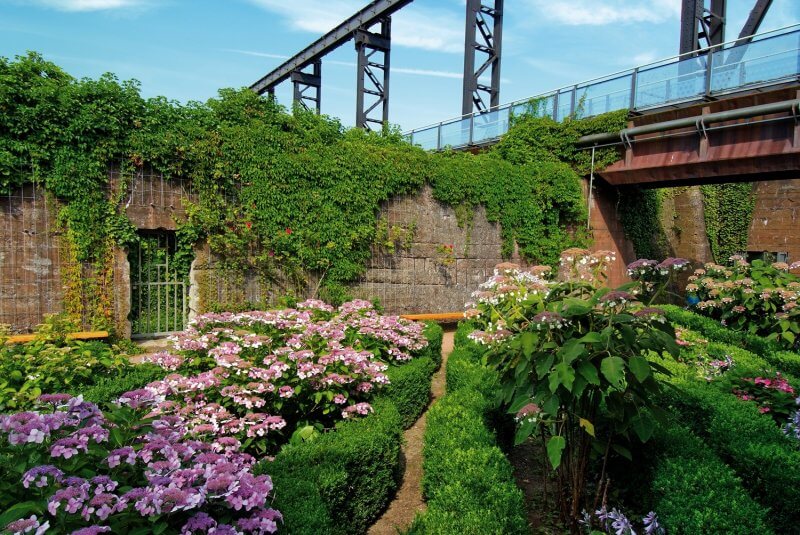
The only thing that still works on the territory of the park is the biological station, in which the employees study plants. They have adapted the former factory structures into flower beds, and the factory with a blast furnace now serves as an observation deck.
The park is very large, so it’s best to come here by bike for a few hours – you won’t get bored.
The attraction also features a playground and several ponds with clean water, where ducks and swans live.
In short, Landschaftspark is a great example of how old factories and plants can be given a second life.
- Address: Emscherstr. 71, 47137 Duisburg, Germany.
- Official website: https://landschaftspark.de
The Tiger and the Tortoise – The Magic Mountain

The tiger and the turtle on Magic Mountain are not symbols of the city, or even the zoo’s beloved inhabitants. They are like two old roller coasters that no longer have high-speed cars. They are meant for walking.
For 8 weeks, 2 German sculptors assembled this bulky structure. They even made a “dead loop,” but you can’t get on it. The attraction is 200 meters high.
Tourists often come to this attraction to admire the views of Duisburg from this landmark. In the evening, the attraction is illuminated.
Travelers complain about the inconvenient location (in the northern part of the city) and the large number of tourists.
Address: Duisburg-Angerhausen, Duisburg, Germany.
Sechs-Seen-Platte Duisburg Park
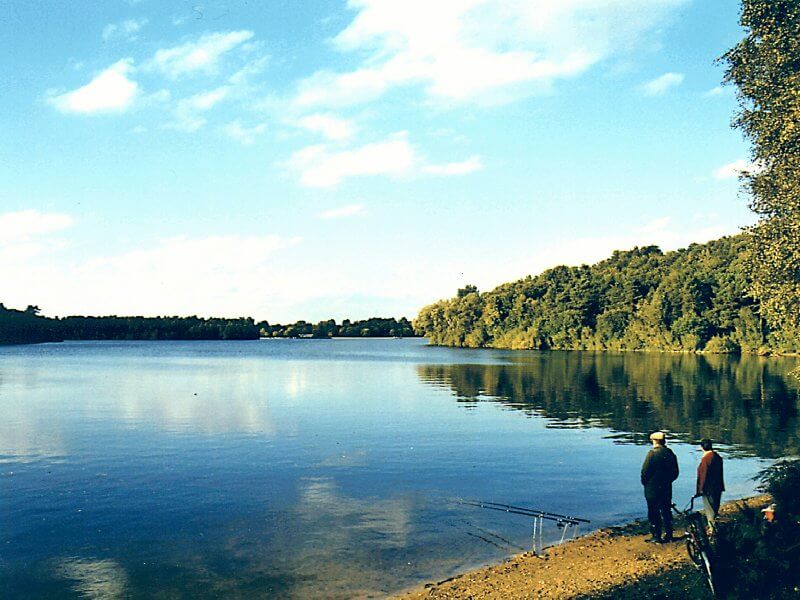
Sechs-Seen-Platte Duisburg is one of the most popular recreational areas for locals and tourists. The park features six picturesque lakes (formerly construction sites that are now completely safe), surrounded by a pine forest. In Sechs-Seen-Platte Duisburg, you can:
- sunbathe on the beach (there are more than 10 beach areas);
- climb Mount Wolfsberg (there is an observation deck);
- to practice sailing (every day, regardless of the weather, instructors are ready to teach tourists how to sail);
- play beach volleyball or basketball on the court;
- walk around (there are special trails for tourists along the lakes and in the forest);
- have a picnic (it is allowed to bring a barbecue to the park);
- go cycling (there are special cycling trails).
Please note that 2 of the 6 lakes are not allowed to be visited. This information can be found on the warning signs and fences that surround these areas.
Address: Kalkweg 262, city of Duisburg.
Duisburg Inner Harbor (Innenhafen Duisburg)

The Inner Harbor is one of the most expensive areas in Duisburg, built on the site of the old port. A number of industrial structures have been preserved, which has led to mixed reactions from tourists. However, the Inner Harbor now offers a variety of cafes, restaurants, shops, and recreational facilities.
Tourists note that this area is very convenient for sports: the wide roads allow you to ride a bicycle or just run in the morning.
Where to find it: Am Innenhafen, Duisburg, Germany.
The Church of the Savior (Salvatorkirche)
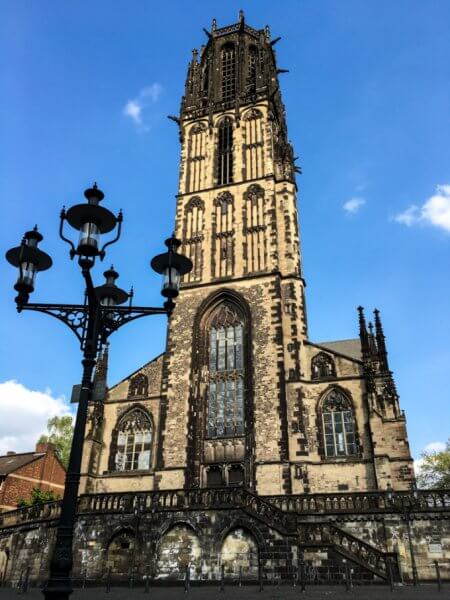
The Church of the Savior in Duisburg is the main Christian church in the city. It was built in 893, and the current appearance was achieved in 1847. It is located near the city hall. The building is constructed in the Gothic style with Baroque elements.
Inside the attraction, there is a wooden organ and bright stained glass windows. The church’s vaults are ivory-colored.
You can visit the church at any time (except during services) and explore its interior.
- Address of the attraction: Burgplatz 19, 47051 Duisburg.
- Opening hours: 9:00 – 18:00.
Where to stay
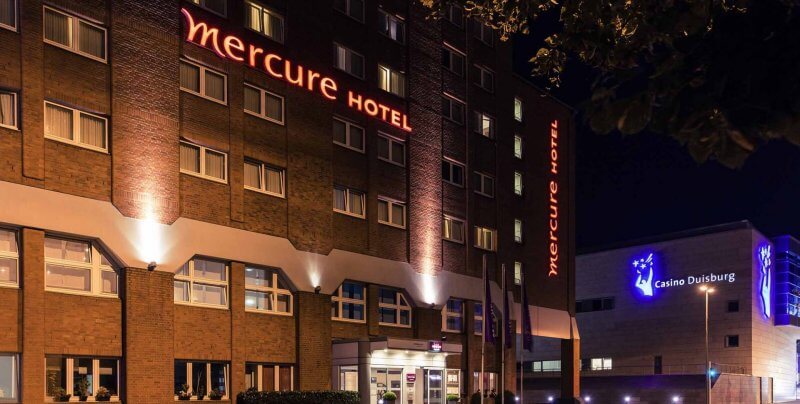
There are about 40 accommodation options in the German city of Duisburg, so it is necessary to book accommodation in advance (at least 2 months in advance). Most of the hotels are 3*.
The average 3-star hotel room for two people during the high season costs 90-110 euros per night. This price includes a good breakfast (either European or American), free parking, free Wi-Fi in the room, and all necessary household appliances. Most rooms are adapted for guests with disabilities. There are no 5-star hotels in the city.
Apartments will be much cheaper. So, an apartment with a good repair in the center for two will cost 35-40 euros per day.
Transport links (Dusseldorf, Dortmund, Cologne)
The nearest major city to Duisburg is Düsseldorf, which is located 28 km away. Dortmund and Duisburg are separated by 50 km, and the distance between Cologne and Duisburg is 56 km. The nearest major airports are:
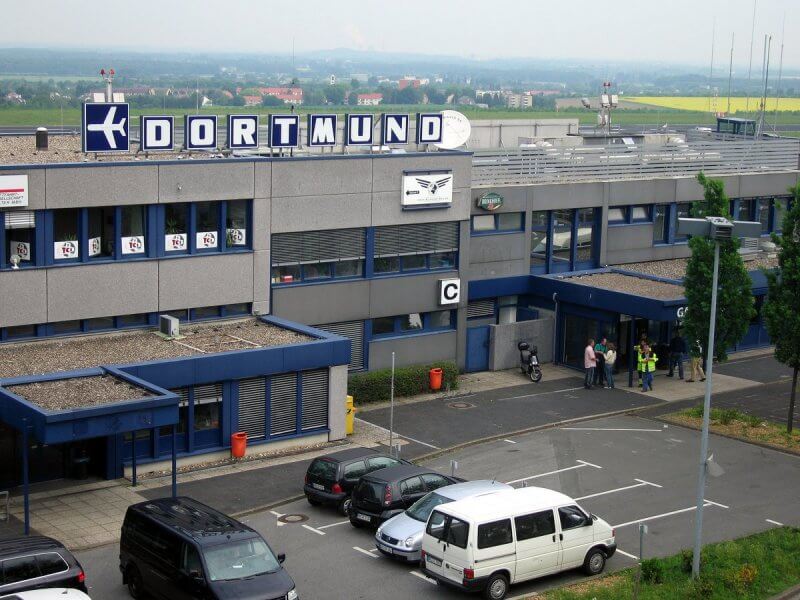
- Essen Airport – Essen, Germany (16 km);
- Düsseldorf Airport – Düsseldorf, Germany (20 km);
- Weeze Airport (Düsseldorf) – Kefeler, Germany (54 km);
- Dortmund Airport – Dortmund, Germany (72 km).
Getting to Duisburg is not difficult. You can do it by train, bus or taxi.
From Dusseldorf:
- By train. You need to take the Ice train from Düsseldorf Hbf to Duisburg Hbf. The journey takes 15 minutes. The cost is 6 euros. Trains run every hour.
- By bus. You need to take a bus at the Düsseldorf Hbf stop and go to Duisburg Hbf. The journey takes 1.5 hours, as the bus goes through Dortmund. The cost is 20 euros. There are 3 buses on this route every day.
- By taxi. Travel time is 18 minutes. The cost is 50-70 euros.
From Dortmund:
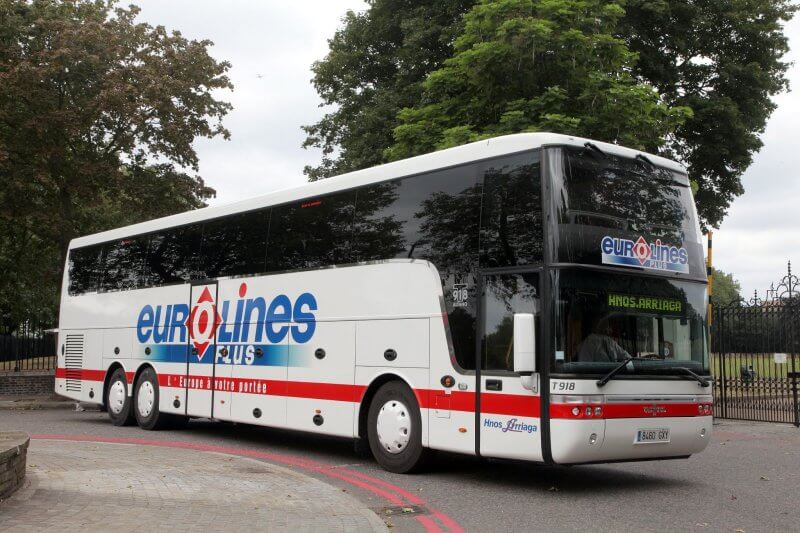
- By train. You need to take the Re6 train from Dortmund Hbf. Get off at Duisburg Hbf. The journey takes 40 minutes. The cost is 18 euros. Trains run every 2 hours.
- By bus (carrier – Eurolines). You need to take the bus at the Dortmund stop and go to Duisburg. The journey time is 1 hour. The cost is 15 euros. There are 3 buses per day.
- By taxi. Travel time is 40 minutes. The cost is 130-150 euros.
From Cologne:
- By train. You need to take the train at Köln Hbf and get off at Duisburg Hbf. The journey takes 35 minutes. The cost is 22 euros. Trains run every 3-4 hours.
- By bus (carrier – Eurolines). You need to get on the bus at the Köln ZOB stop and get off at Duisburg ZOB. The travel time is 1 hour and 10 minutes. The cost is 30-35 euros. Buses run on this route twice a day.
- By taxi. Travel time is 45 minutes. The cost is 140-160 euros.
It is more convenient to buy train tickets at the main railway stations in cities. It is better to buy a bus ticket online, on the official website of the carrier: www.eurolines.eu. If you follow the news on the website, you can buy a ticket with a significant discount.
Interesting facts
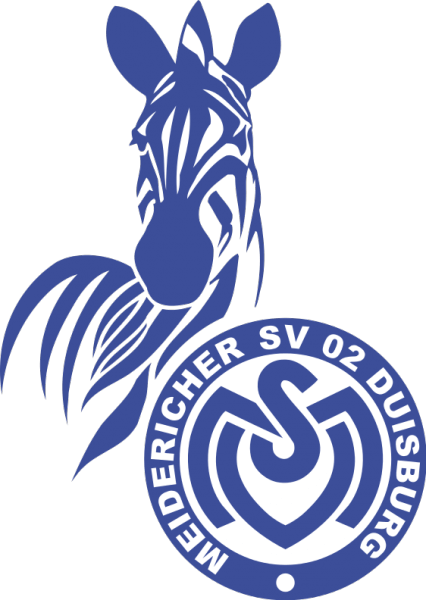
- The most famous person who ever lived in Duisburg was Peter, who was the first chronicler of the Teutonic Order.
- Most of the residents of Duisburg have Turkish roots – they are the grandchildren and great-grandchildren of workers who once came to Germany in search of a better life.
- The city of Duisburg has its own football club with the same name.
- Duisburg is home to the largest mosque in Germany.
Duisburg, Germany, is an interesting and informal place to visit for active and adventurous tourists.

